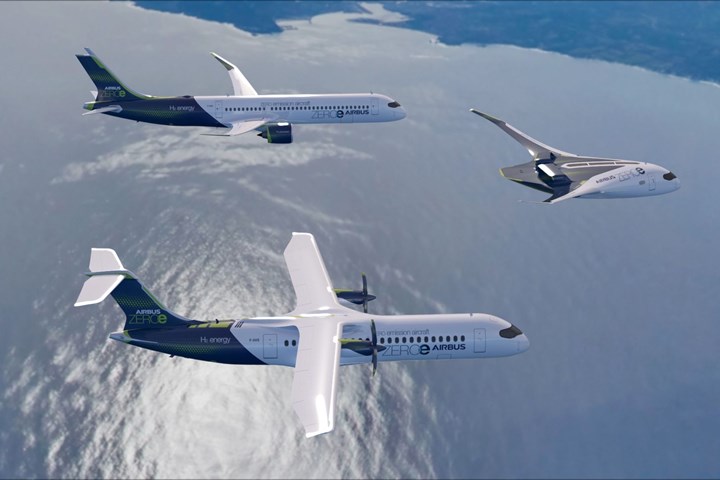Airbus (Toulouse, France) is pushing back its original 2035 objectives for the ZEROe passenger aircraft concepts, delaying service-to-entry targets for the hydrogen-powered aircraft by up to 10 years. It has also canceled plans to flight test a fuel cell powertrain on its A380 flying testbed. The aerospace company told Aviation Week that it is still “committed to ... bringing a commercially viable, fully electric hydrogen-powered aircraft to market” but recent developments regarding the hydrogen ecosystem, including infrastructure, production, distribution and regulatory frameworks, has been “slower than anticipated.”
The news was originally reported by the French AFP news agency, coming closely on the heels of Airbus’ plans to pause the CityBus NextGen eVTOL program, which cited a lack of maturation in battery technologies for the advanced air mobility (AAM) platform. Airbus says the new timeframe of its ZEROe program will be as far as 2040-2045.
The ZEROe initiative was announced in 2020. Three concepts — a turbofan design (120-200 passengers), a turboprop design (up to 100 passengers) and a blended-wing body (BWB) design (up to 200 passengers) — were planned to each represent a different approach to achieving zero-emission flight, exploring various technology pathways and aerodynamic configurations. In 2024, the company opened the ZEROe development center (ZEDC) in Stade, Germany, to develop these hydrogen technologies, which included system using fiber-reinforced composite materials, such as cryogenic LH2 tanks.
According to several sources, the aviation industry is still focusing on advancing sustainable aviation fuel (SAF) solutions but “limited availability” and “higher costs” continue to present ongoing challenges. Hydrogen will still remain a target, though more of a long-term focus headed into 2050.






 Lu public network security: 37140202000173
Lu public network security: 37140202000173



